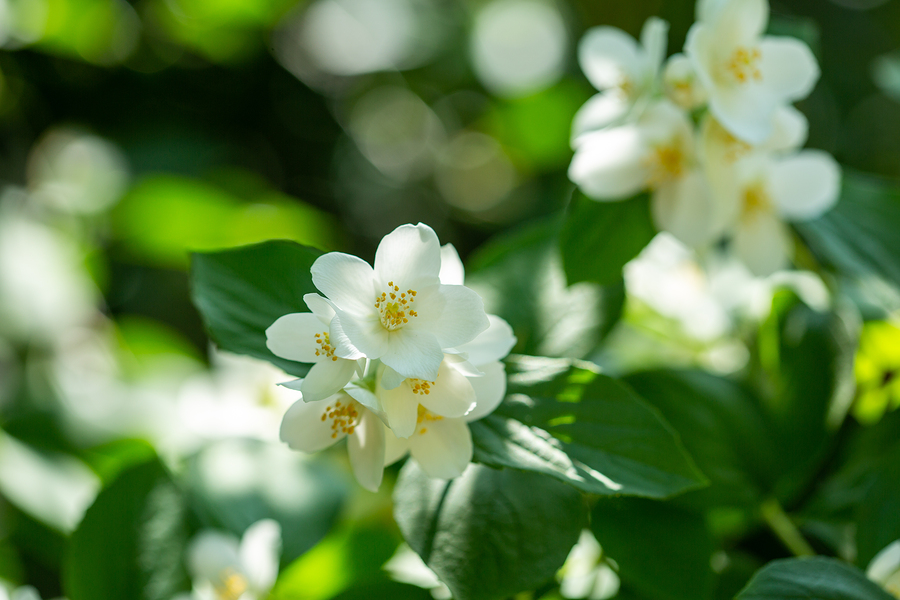(Editor’s Note: There has been some confusion about what type of Jasmine the study is talking about so we wanted to clear that up. What most people know as Jasmine (taxonomic name Jasminum /ˈjæsmɪnəm/) is a genus of shrubs and vines in the olive family (Oleaceae). It contains around 200 species native to tropical and warm temperate regions of Eurasia, Australasia and Oceania. Jasmines are widely cultivated for the characteristic fragrance of their flowers. For this study, Gardenia jasminoides was used. According to Wikipedia, it is an “evergreen flowering plant of the coffee family Rubiaceae. It originated in Asia and is most commonly found growing wild in Vietnam, Southern China, Korea, Taiwan, Japan, Myanmar, India, and Bangladesh. With its shiny green leaves and heavily fragrant white summer flowers, it is widely used in gardens in warm temperate and subtropical climates, and as a houseplant in temperate regions.”)
If you experience frequent bouts of anxiety or unusual amounts of stress, it’s likely you find it hard to wind down at the end of the day. That same stress and anxiety hindering your ability to calm down leads to zero relaxation and often sleepless nights.
It’s no wonder that two of the leading causes of insomnia are anxiety and stress. There’s truly nothing worse than a night riddled with a brain that just won’t stay quiet. Sleepless nights spent tossing and turning, take a major toll on our overall physical and mental well-being.
RELATED STORY:
Studies have found that keeping a jasmine plant in your room could be the solution! The scent produced by Jasmine plants has been linked to a reduction of anxiety levels.
What is the Jasmine Plant?
Jasmine is a night blooming flower known for it’s romantic and sweet fragrance.
It’s often used to make teas, incense, essential oils, and perfumes. But aside from its floral notes, Jasmine flower is also used to make medicine. It’s proven to have health benefits expanding beyond being used as a fragrance. Jasmine also boasts aiding in illnesses such as hepatitis and cancer, used as a relaxation sedative, and even as an aphrodisiac.
Jasmine for Stress and Anxiety
Affecting approximately 40 million adults, anxiety disorders are the most common mental illness in the United States. Stress and anxiety are known inhibitors of sleep.
When there’s a lack of sleep, there is a lack of productivity, poor mood, low energy levels, and overall poor quality of life. For those who have ever suffered sleeplessness due to anxiety and stress, you understand that no sleep only makes stressors more prominent.
It’s believed that high levels of toxins in the air increase stress and anxiety. Additionally, it’s been found that there is a correlation between stress and oxygen levels. Therefore, health concerns such as anxiety, depression, and panic attacks have less room to breed when air quality is improved.
Studying Jasmine
One way to combat a high level of toxins in the air is to keep a jasmine plant nearby. Research concludes a jasmine plant in your room can serve as relief for sleeplessness, anxiety, and stress, among other illnesses. Simply breathing the aromatic scent of the plant can help to significantly calm your anxieties.
German researchers experimented by filling mice cages with the fragrance of jasmine. It was found that the scent calmed the animals down substantially. The mice became so calm they even opted to cease all activity and then sit quietly in a corner.
RELATED STORY:
The chemical known as GABA showed the effects of the jasmine fragrance. Brain scans revealed relief from anxiety while encouraging rest. Professor Hanns Hatt from Ruhr University in Bochum, Germany states the evidence “can be seen as evidence of a scientific basis for aromatherapy.”
With results showing jasmine at least five times more effective than other fragrances, scientists concluded it’s more effective than sleeping pills and anti-anxiety medications such as valium.
Additional Benefits of Jasmine
Aside from sleep, stress, and anxiety, there are endless benefits to the jasmine plant. Other benefits of jasmine include:
- Reduced tension
- Mood Booster
- Improved alertness and cognitive performance
- Hormone balance
- Treatment of hot flashes and mood swings
- Increased libido
RELATED STORY:
Keeping a jasmine plant in your home isn’t the only way to reap the benefits of jasmine. Other great ways to enjoy the medical benefits of jasmine is through jasmine teas and essential oils.
*Article originally appeared at Healthy Holistic Living.












